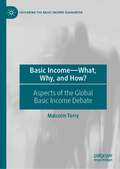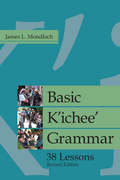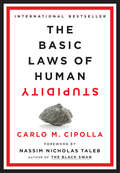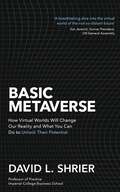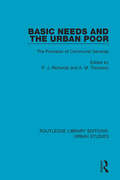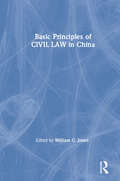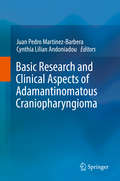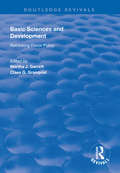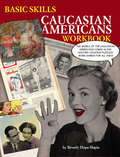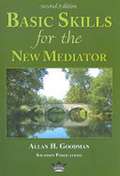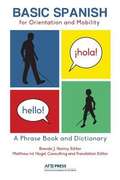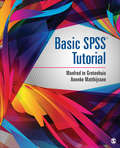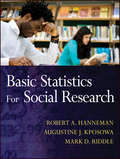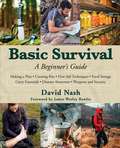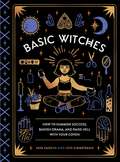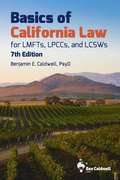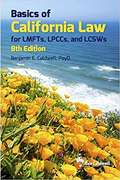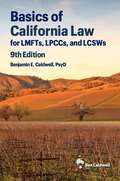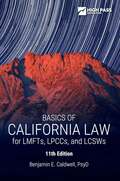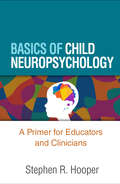- Table View
- List View
Basic Income - From Vision to Creeping Transformation of the Welfare State
by Rolf G. Heinze Jürgen SchuppThe present publication constitutively expands the field of discourse on the topic of basic income and explores the possibilities of its introduction as well as the opportunities and risks. Although all visionary proposals for an unconditional basic income (BGE) have so far not been implemented politically, at least in democratically constituted welfare states, the question of implementation or the conditions for success and the identification of possible blockades have only been dealt with marginally. Recent publications on a BGE also show this political-institutional "blindness" and do not address enough the reasons for the failure so far. Without a transfer strategy, however, the idea will fail in Germany due to such implementation naivety. In this book, therefore, the state of the debate on basic income is developed further to the extent that it is integrated into welfare-state development processes and current challenges for the "safeguarding of social security". In addition, a social-scientific classification of hitherto visionary guarantee elements of a basic income model is undertaken, linking up with the "silent" change to a socially investing state.
Basic Income—What, Why, and How?: Aspects of the Global Basic Income Debate (Exploring the Basic Income Guarantee)
by Malcolm TorryThe global Basic Income debate is now widespread, diverse, and relatively well resourced by academic and more popular literature: but that does not mean that there is universal agreement about every topic of discussion. In fact, there is still a quite heated debate about some of the most basic questions, such as ‘What is a Basic Income?’ ‘What’s the point?’, and ‘Is it feasible?’This book is not yet another general introduction to Basic Income. There are already plenty of those. It is entirely about those aspects of the debate about which there is most discussion and sometimes the most conflict. It is based on conference papers, previously published chapters, and other previously published articles, working papers, and reports: material that has already benefited from consultation and debate, as is appropriate for a book about aspects of a debate that are the subject of frequent consultation and discussion.
Basic K'ichee' Grammar: 38 Lessons, Revised Edition (IMS Monograph Series)
by James L. MondlochThe K’ichee’an languages—K’ichee’, Kaqchikel, Tz¢utujil, Sakapulteko, Achi, and Sipakapense—occupy a prominent place among the indigenous languages of the Americas because of both their historical significance and the number of speakers (more than one million total). Basic K'ichee' Grammar is an extensive and accurate survey of the principal grammatical structures of K’ichee’. Written in a clear, nontechnical style to facilitate the learning of the language, it is the only K’ichee’ grammar available in English. A pedagogical rather than a reference grammar, the book is a thorough presentation of the basics of the K’ichee’ Maya language organized around graded grammatical lessons accompanied by drills and exercises. Author James L. Mondloch spent ten years in K’ichee’-speaking communities and provides a complete analysis of the K’ichee’ verb system based on the everyday speech of the people and using a wealth of examples and detailed commentaries on actual usage. A guide for learning the K’ichee’ language, Basic K'ichee' Grammar is a valuable resource for anyone seeking a speaking and reading knowledge of modern K’ichee’, including linguists, anthropologists, and art historians, as well as nonacademics working in K’ichee’ communities, such as physicians, dentists, community development workers, and educators.
The Basic Laws of Human Stupidity: The International Bestseller
by Carlo M. Cipolla"A masterly book" —Nassim Nicholas Taleb, author of The Black Swan "A classic" —Simon Kuper, Financial Times An economist explains five laws that confirm our worst fears: stupid people can and do rule the worldThroughout history, a powerful force has hindered the growth of human welfare and happiness. It is more powerful than the Mafia or the military. It has global catastrophic effects and can be found anywhere from the world's most powerful boardrooms to your local bar. It is human stupidity. Carlo M. Cipolla, noted professor of economic history at the UC Berkeley, created this vitally important book in order to detect and neutralize its threat. Both hilarious and dead serious, it will leave you better equipped to confront political realities, unreasonable colleagues, or your next dinner with your in-laws. The Laws: 1. Everyone underestimates the number of stupid individuals among us. 2. The probability that a certain person is stupid is independent of any other characteristic of that person. 3. A stupid person is a person who causes losses to another person while deriving no gain and even possibly incurring losses themselves. 4. Non-stupid people always underestimate the damaging power of stupid individuals. 5. A stupid person is the most dangerous type of person.
Basic Metaverse: How Virtual Worlds Will Change Our Reality and What You Can Do to Unlock Their Potential
by David ShrierWhat is the metaverse? Quite simply, it's a digital platform to help people collaborate, work and play in new ways, in an immersive 3D environment. In Basic Metaverse, leading futurist David L. Shrier explains how the technology works, unpacks its potential uses - including its relationship to the development of Web3 - and its impact on everyday life and work. He explores some of the legal and moral quandaries that could accompany widespread adoption of this transformational technology, from issues of wealth disparity and access to what happens if your virtual avatar commits a crime in the metaverse.The metaverse future is full of possibility. One thing we can be certain of is that it will be stranger than we can imagine. Join Shrier as he journeys across virtual worlds in search of understanding.
Basic Needs and the Urban Poor: The Provision of Communal Services (Routledge Library Editions: Urban Studies)
by P. J. Richards and A. M. ThomsonOriginally published in 1984. The diverse problems suffered by the urban poor in Asia and the means by which their welfare levels can be raised are investigated comprehensively in this study. All chapters, written by specialists, deal with a particular subject but the general theme remains that the factors causing urban poverty and low income levels are interconnected and transmitted from one generation to another. It is intended that this study will lead to discussion of the problems involved in providing services for the urban poor and result in the increased responsiveness of urban management. This title will be of interest to students of urban and development studies.
Basic Offshore Safety: Safety induction and emergency training for new entrants to the offshore oil and gas industry
by Abdul KhaliqueComprehensive insight into the offshore oil and gas industry for those intending to choose it as a career Full syllabus coverage for OPITO BOSIET, FOET, MIST and IMIST courses Produced in full colour with over 180 images Basic Offshore Safety covers everything that newcomers to the offshore oil and gas industry need to know ?prior to travelling offshore or when attending OPITO's Basic Offshore Safety Induction and Emergency Training (BOSIET), Minimum Industry Safety Training (MIST), Further Offshore Emergency Training (FOET) and International MIST courses. Primarily focused on the oil industry, this book introduces readers to the key safety topics in the offshore support vessel industry and common to the renewable industry. Written in easy to follow steps and including references to both the legislation and guidance where relevant, Abdul Khalique walks the reader through the hazards they are likely to encounter when travelling to, from or working offshore, showing how to minimise risks and deal with any issues that may arise at any stage of the work.
Basic Principles of American Government
by William R. Sanford Carl R. GreenBasic Principles of American Government is a book about the system of government established by that Constitution. Just as important, it is about the ways in which that system has changed over the years to meet today's needs.
Basic Principles of Civil Law in China
by David M JonesThis is an abridged translation of the principal Chinese textbook on civil law, which was published as part of the restructuring of China's legal system following the Third Plenum of the Chinese Communist Party in late 1978. Because the closest thing China has to a civil code - the General Provisions of Civil Law enacted in 1986 - is very incomplete, this treatise is an authoritative source on the subject. "Basic Principles of Civil Law in China" translates those portions of the Chinese text that are likely to be most useful for foreigners dealing with China, such as material on contracts, torts, joint-ventures, negotiable instruments and technology transfer. It also contains general material on such matters as agency and partnership, the general principles of juristic persons, and statutes of limitations.
Basic Research and Clinical Aspects of Adamantinomatous Craniopharyngioma
by Juan Pedro Martinez-Barbera Cynthia Lilian AndoniadouThis astute volume brings together the latest expert research on adamantinomatous craniopharyngiomas (ACPs). ACPs are histologically benign but clinically aggressive tumors exhibiting a high propensity for local invasion into the hypothalamus, optic and vascular structures. These tumors, as well as the current treatments, may result in pan-hypopituitarism, diabetes insipidus, morbid obesity followed by type II diabetes mellitus, blindness, as well as serious behavioral and psychosocial impairments. Exploring in detail advances in both the understanding of tumor biology as well as clinical advances in patient management are explored in detail, this book will also look towards potential new treatment approaches. Basic Research and Clinical Aspects of Adamantinomatous Craniopharyngioma is the first book compiling all current research on ACPs. Mouse and human studies have unequivocally demonstrated that mutations in CTNNB1 encoding -catenin underlie the etiology of the majority, if not all ACP tumors. Genetic studies in mice have shown that ACPs are tumors of the pituitary gland and not of the hypothalamus as previously thought, and are derived from Rathke's pouch precursors. In addition, a role for tissue-specific adult pituitary stem cells has been revealed as causative of ACP. Together, these studies have provided novel insights into the molecular and cellular etiology as well as the pathogenesis of human ACP. Finally, this volume covers new treatment approaches that have been shown to be effective both in reducing ACP burden as well as reducing the morbidity associated with therapy.
Basic Sciences and Development: Rethinking Donor Policy (Routledge Revivals)
by Martha J. Garrett Claes G. Granqvist Berhanu M. Abegaz Ivan Chambouleyron Jacques Gaillard Demissu Gemeda Mohamed Hag Ali Hassan Nguyen Van Hieu Narciso Matos Jan S. Nilsson Govindarajan Padmanaban Stig Strömholm Erik W. ThulstrupFirst published in 1998. In the Third World, development-orientated research in the basic sciences have received a negligible share of available resources from domestic and foreign sources. This book addresses the growing concerns regarding the policies guiding support to development research in recipient countries.
Basic Skills Caucasian Americans Workbook
by Beverly Hope SlapinThe "mysterious" world of Caucasian Americans comes alive through history lessons, puzzles, and word games for all ages in this humorous parody. Presented as a scholastic style educational workbook, it illuminates the history of Caucasian Americans in the United States from a Native American perspective. Chapters with such names as "Caucasian American Languages," "Caucasian American Food Production," and "Caucasian American Religions, Ceremonies, and Superstitions," subversively and playfully critique the role Caucasian Americans have played in shaping the United States. Including delightful illustrations, word scrambles, and other fun exercises, this hilarious lampoon adeptly teaches progressive values through humor.
Basic Skills For The New Mediator
by Allan H. GoodmanBASIC SKILLS FOR THE NEW MEDIATOR provides a detailed overview of mediation, from the premediation conference through all stages of the mediation session. It guides the new mediator through the mediation process by answering the one hundred questions most frequently asked by new mediators. BASIC SKILLS FOR THE NEW MEDIATOR has been used successfully for self-instruction and as a training manual. Experienced mediators and attorneys who represent clients in mediation will also find this book extremely useful. The Appendix "Everything You Never Wanted to Know About the Rules of Evidence" is especially valuable for the non-attorney mediator, who must often deal with the evidentiary vocabulary of the legal profession. You will learn to establish your authority as a mediator, schedule the mediation session, deliver the mediator's opening statement, prioritize issues, preside during joint sessions, conduct private caucuses, overcome impasses, identify "hidden agenda" and "throwaway" items, deal with parties who lack settlement authority, and aid parties to achieve a viable settlement.
Basic Spanish for Orientation and Mobility: A Phrase Book and Dictionary
by Brenda J. NaimyProfessionals providing services to people who are visually impaired work with individuals from broadly diverse ethnic, religious, and cultural groups. Many speak languages other than English. Basic Spanish for Orientation and Mobility is a new user-friendly, valuable tool for communicating O&M instruction to students who primarily speak Spanish. This handy and comprehensive manual provides O&M lessons broken down step-by-step and displayed side-by-side in English and Spanish. It also includes phrases and O&M terminology needed to convey instruction, and easy-to-read vocabulary lists
Basic SPSS Tutorial: Szafran: Answering Questions With Statistics + Grotenhuis: Basic Spss Tutorial + Francis: Introstats Online + Sage Ibm® Spss® Statistics V23. 0 Student Version
by Manfred Te Grotenhuis Anneke MatthijssenThis supplementary book for the social, behavioral, and health sciences helps readers with no prior knowledge of IBM® SPSS® Statistics, statistics, or mathematics learn the basics of SPSS. Designed to reduce fear and build confidence, Basic SPSS Tutorial by Manfred te Grotenhuis and Anneke Matthijssen guides readers through point-and-click sequences using clear examples from real scientific research and invites them to replicate the findings. Relevant outcomes are provided for reference, and exercises at the end of Chapters 2 – 5 provide additional practice. After reading the book and using the program, readers will come away with a basic knowledge of the most commonly used procedures in statistics.
Basic SPSS Tutorial: Szafran: Answering Questions With Statistics + Grotenhuis: Basic Spss Tutorial + Francis: Introstats Online + Sage Ibm® Spss® Statistics V23. 0 Student Version
by Manfred Te Grotenhuis Anneke MatthijssenThis supplementary book for the social, behavioral, and health sciences helps readers with no prior knowledge of IBM® SPSS® Statistics, statistics, or mathematics learn the basics of SPSS. Designed to reduce fear and build confidence, Basic SPSS Tutorial by Manfred te Grotenhuis and Anneke Matthijssen guides readers through point-and-click sequences using clear examples from real scientific research and invites them to replicate the findings. Relevant outcomes are provided for reference, and exercises at the end of Chapters 2 – 5 provide additional practice. After reading the book and using the program, readers will come away with a basic knowledge of the most commonly used procedures in statistics.
Basic Statistics for Social Research
by Robert A. Hanneman Augustine J. Kposowa Mark RiddleA core statistics text that emphasizes logical inquiry, not math Basic Statistics for Social Research teaches core general statistical concepts and methods that all social science majors must master to understand (and do) social research. Its use of mathematics and theory are deliberately limited, as the authors focus on the use of concepts and tools of statistics in the analysis of social science data, rather than on the mathematical and computational aspects. Research questions and applications are taken from a wide variety of subfields in sociology, and each chapter is organized around one or more general ideas that are explained at its beginning and then applied in increasing detail in the body of the text. Each chapter contains instructive features to aid students in understanding and mastering the various statistical approaches presented in the book, including: Learning objectives Check quizzes after many sections and an answer key at the end of the chapter Summary Key terms End-of-chapter exercises SPSS exercises (in select chapters) Ancillary materials for both the student and the instructor are available and include a test bank for instructors and downloadable video tutorials for students.
Basic Statistics in Criminology and Criminal Justice: Volume 1
by David Weisburd Chester Britt David B. Wilson Alese WooditchThis introductory textbook takes a building-block approach that emphasizes the application and interpretation of statistics in research in crime and justice. This text is meant for both students and professionals who want to gain a basic understanding of common statistical methods used in criminology and criminal justice before advancing to more complex statistical analyses in future volumes. This book emphasizes comprehension and interpretation. As the statistical methods discussed become more complex and demanding to compute, it integrates statistical software. It provides readers with an accessible understanding of popular statistical programs used to examine real-life crime and justice problems (including SPSS, Stata, and R). In addition, the book includes supplemental resources such as a glossary of key terms, practice questions, and sample data. Basic Statistics in Criminology and Criminal Justice aims to give students and researchers a core understanding of statistical concepts and methods that will leave them with the confidence and tools to tackle the statistical problems in their own research work.
Basic Survival: A Beginner's Guide
by James Wesley Rawles David NashMany people are beginning to become concerned by increasing natural disasters, global conflict, and political unrest and the smart ones want to do something about it. Unfortunately, increased awareness about disaster preparedness has caused an information overload. It is easy to become overwhelmed by the sheer amount of information available. Basic Survival helps readers dig out from under the avalanche of preparedness information. It dispels myths, introduces concepts, and teaches the basics of how to start preparing for disaster. Author David Nash, a lifelong prepper and the author of 52 Prepper Projects and The Prepper’s Guide to Foraging outlines an all-hazards approach to disaster management similar to the ones used by the military and federal and state governments. Nash has over ten years of experience in government emergency management as a planner, a first responder, and as an emergency operations center manager. Basic Survival is a great resource that presents a strong foundation for being prepared when an emergency hits.
Basic Witches: How to Summon Success, Banish Drama, and Raise Hell with Your Coven
by Jaya Saxena Jess ZimmermanA magical lifestyle guide for everything from powering up a stylish crystal to banishing terrible Tinder datesWant to feel terrifyingly beautiful? Wear the right color of eye shadow to project otherworldly glamour. Need to exorcise a toxic friendship? Repeat the proper incantation and make it disappear. Want to increase your energy? Whip up a tasty herbal “potion” to rev up your stamina. DIY projects, rituals, and spells—along with fun historical sidebars—summon the best trends of the modern witchy lifestyle and the time-trusted traditions of the hell-raising women of the past. With humor, heart, and a hip sensibility, Jaya Saxena and Jess Zimmerman dispense witchy wisdom for the curious, the cynical, and anyone who could use a magical boost.Selected Table of Contents:CHAPTER 1 - Self-Initiation: An Induction into Basic WitcheryWhat We Mean by “Witchcraft”Our Favorite Pop Culture WitchesCHAPTER 2 - Glamours: The Power to Change How You LookHow to Clothe Yourself in Literal DarknessThe Dark Magic of Unfeminine HaircutsA Spell for Self-CareCHAPTER 3 - Healing: The Power to Care for YourselfA Spell to Make Peace with Your BodyMagical ExerciseA Ritual for a Relaxing Netflix BingeCHAPTER 4 - Summoning: The Power to Care for Others (and Have Them Care for You)The Transformative Power of VulnerabilityA Collaborative Ritual to Deepen FriendshipCHAPTER 5 - Enchantment: The Power to Make Choices about Love and SexConjuring Your Perfect MateThe Magic Circle of ConsentA Spell for Talking about SexCHAPTER 6 - Banishment: The Power to Avoid What Brings You DownExpelling Social ToxicityThe Different Types of Personal DemonsA Spell to Counter Impostor SyndromeCHAPTER 7 - Divination: The Power to Decide Your DestinyA Spell to Name Your Heart’s DesireHow to Read Tea Leaves
Basics of California Law for LMFTs, LPCCs, and LCSWs
by Benjamin E. CaldwellThis seventh edition is updated to 2020 law and professional ethics codes, and includes new information on telehealth, employment law, license portability, testimonials, and more.Written by a therapist for other therapists (and therapists in training), Basics of California Law takes the many nuances of California law and regulation and puts them in digestible, easy-to-apply language. It covers all three of California's major master's-level mental health professions: Marriage and Family Therapy, Professional Clinical Counseling, and Clinical Social Work.Topics covered include Licensing, Supervision, Unprofessional Conduct, Confidentiality, Documentation, Families and Children, Abuse Reporting, Business & Marketing, Technology, and Advocacy. The text includes hundreds of footnotes identifying specific articles, links, and sections of California law and regulation that serve as reference material for this text.
Basics Of California Law For LMFTs, LPCCs, And LCSWs
by Benjamin E. CaldwellWritten by a therapist for other therapists (and therapists in training), Basics of California Law takes the many nuances of California law and regulation and puts them in digestible, easy-to-apply language. It covers all three of California's major masters-level mental health professions: Marriage and Family Therapy, Professional Clinical Counseling, and Clinical Social Work.
Basics Of California Law For Lmfts, Lpccs, And Lcsws
by Benjamin E. CaldwellWritten by a therapist for other therapists (and therapists in training), Basics of California Law takes the many nuances of California law and regulation and puts them in digestible, easy-to-apply language. It covers all three of California's major masters-level mental health professions: Marriage and Family Therapy, Professional Clinical Counseling, and Clinical Social Work. This ninth edition is updated to 2022 law, and includes the following changes: Major changes in supervision requirements Updates to LMFT and LPCC scopes of practice Updated information on telehealth New information on working from home New information on holding multiple licenses New requirements for Emotional Support Animal letters And much more.
Basics Of California Law For Lmfts, Lpccs, And Lcsws
by Benjamin E. CaldwellWritten by a licensed therapist, Basics of California Law takes the many nuances of California law and regulation and puts them in digestible, easy-to-apply language. It covers all three of California's major masters-level mental health professions: Marriage and Family Therapy (LMFTs), Professional Clinical Counseling (LPCCs), and Clinical Social Work (LCSWs). This 11th edition is updated to 2024 law, and includes changes to the rules on elder and dependent adult abuse reporting and more. Topics covered in this text include Licensing, Supervision, Confidentiality, Documentation, Families and Children, Abuse Reporting, Technology, Business and Marketing, Employment, Unprofessional Conduct, and Advocacy.
Basics of Child Neuropsychology: A Primer for Educators and Clinicians
by Stephen R. HooperWritten expressly for non-neuropsychologists, this book offers a concise, friendly introduction to the developing brain and its functions. Stephen R. Hooper renders complex concepts accessible as he describes the structure of the brain and the workings of the nervous system. The book explains how findings from neuropsychological assessments can help educators and clinicians to better understand and remediate children's difficulties. A range of neurodevelopmental and medical conditions that affect learning and behavior from early childhood through adolescence are explored through a neuropsychological lens. Helpful features include key Take-Home Points distilled from the chapters and recommended print and online resources.

